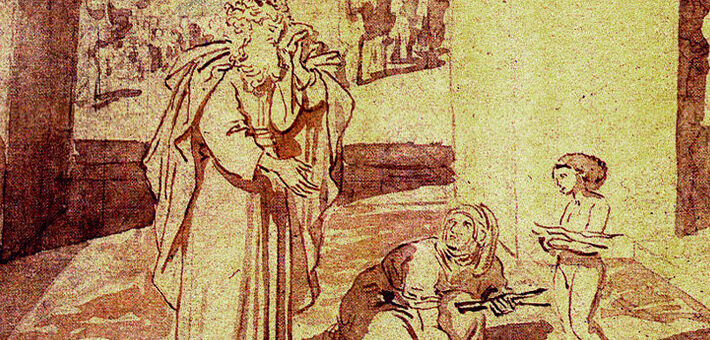Commentary on 1 Kings 17:8-16
The widow of Zarephath labors under a death sentence.
This shapes her words and her behaviors: “I am now gathering a couple of sticks, so that I may go home and prepare it for myself and my son, that we may eat it, and die” (1 Kings 17:12). Like Hagar before her (Genesis 21:16), the unnamed widow of Zarephath has resigned herself to the fact that she and her child are on a slow descent to the underworld. In great despair, Elijah finds the widow preparing for her own “last supper.” As the Elijah narratives indicate, however, the God of Israel specializes in feeding the hungry (1 Kings 17:1-7) and raising the dead (1 Kings 17:17-24). And this story is no exception.
As in the story immediately preceding it, Elijah is driven to a new place by the word of the Lord (1 Kings 17:2, 8-9). On the surface, these are places of barrenness and scarcity. In the prior account, for instance, Elijah is commanded, “hide yourself by the Wadi Cherith” (1 Kings 17:3) east of the Jordan. The Wadi Cherith provides Elijah with water, and God enlists ravens to bring the prophet bread and meat, morning and evening (1 Kings 17:6). Creation is summoned to provide for God’s faithful prophet. In 17:8-16, God commands Elijah to go to Zarephath, where a widow (who replaces the ravens) is commanded to feed him. Upon his arrival, Elijah discovers that the widow is an unlikely source of hospitality. In fact, she is so short on food that she is preparing for her own death (1 Kings 17:12).
After arriving at Zarephath, Elijah commands the widow to bring him a little water and a morsel of bread (1 Kings 17:10-11). Swearing an oath, she confronts the prophet directly with the hard facts of her situation: “As the Lord your God lives, I have nothing baked, only a handful of meal in a jar, and a little oil in a jug; I am now gathering a couple of sticks, so that I may go home and prepare it for myself and my son, that we may eat it, and die.” The widow sharply contradicts what Elijah knows by a promise: “I have commanded a widow there to feed you” (1 Kings 17:9). And it is in the midst of this contradiction that God will have an opportunity to act.
But let’s reflect first on Elijah’s words. He speaks crazy talk. When his eyes see only scarcity, he talks about abundance. The prophet assumes provision, when the widow’s words speak only of desolation. Elijah brings a word of faith into a moment of deep fear and resignation. After hearing about the widow’s preparations for death, Elijah gives the widow the same word of promise God gave to Hagar: “Fear not” (1 Kings 17:13; cf. Genesis 21:17). The prophet goes on to speak as if the promise of God was already fulfilled: “Do not be afraid … but first make me a little cake of it and bring it to me, and afterwards make something for yourself and your son” (1 Kings 17:13). Elijah’s words, although seemingly absurd, actually invite the widow to participate in the new reality God’s promises were creating, but which for the moment remain hidden from view.
Elijah then further clarifies God’s promises: “For thus says the Lord the God of Israel: The jar of meal will not be emptied and the jug of oil will not fail until the day that the Lord sends rain on the earth” (1 Kings 17:14). God will provide the widow and her son the means to survive this terrible drought, for which God is responsible (cf. 1 Kings 17:1-7). Like Hagar and her son, this widow and her son were not forgotten by the God of Israel, who notices the loss of even one sparrow (Matthew 10:29-31). Once condemned to hunger, death, and suffering, the widow is given a new word that nullifies her original death sentence. Death is swallowed up in promise, despair in hope. The reversal of death in this story (vv. 8-16) anticipates the literal reversal of death in the next (vv. 17-24).
Animating this story is the painful contradiction between God’s word of promise and a death sentence. Elijah’s ministry in this story is to bring a word from the outside that silences and finally nullifies the death sentence resting over the head of the widow and her son. This gracious gift of salvation comes in the form of sustenance — daily bread. While most of us will not find ourselves preaching to drought-afflicted persons, we will be preaching to people who live in various ways under a death sentence. And like Elijah, we are also called to bring a sustaining word of promise from the outside.


June 5, 2016